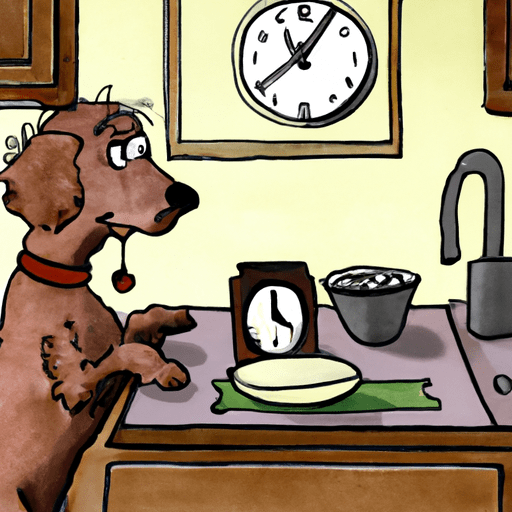Understanding Your Dog’s Digestive System
Your dog’s digestive system is a complex process, made up of several stages. It starts in the mouth, where food is broken down into smaller pieces, and ends at the anus, where waste is expelled. On average, it takes about 4 to 5 hours for a dog to digest its meal and 10 to 24 hours to pass it as waste.
- Mouth and Esophagus: Your dog breaks down food into smaller pieces using its teeth. It then travels down the esophagus to the stomach.
- Stomach: Here, food is mixed with digestive enzymes to break it down further.
- Small Intestine: Nutrients are absorbed into your dog’s bloodstream.
- Large Intestine: Excess water is removed, and waste material is formed.
- Anus: Waste material is expelled from the body.
Factors That Affect Your Dog’s Digestion
Several factors can affect when your dog will poop after eating. It’s important to keep these in mind as you observe your dog’s habits.
- Age: Younger dogs tend to have faster metabolisms and may poop more frequently than older dogs.
- Diet: A diet high in fiber can encourage more frequent bowel movements.
- Health: Certain health conditions, such as digestive disorders, can affect your dog’s bowel movements.
- Exercise: Physical activity can stimulate digestion and bowel movements.
Monitoring Your Dog’s Poop Schedule
Keeping a close eye on your dog’s poop schedule can provide valuable insights into their health. Here’s what you should be looking for:
- Frequency: Most dogs poop at least once a day, but it’s not unusual for some to go more often.
- Consistency: Healthy dog poop should be firm but not hard, and hold its shape when picked up.
- Color: Normal dog poop is brown. Any other colors might indicate a health problem.
| Color | Possible Cause |
|---|---|
| Red or black | Internal bleeding |
| White or gray | Liver or gallbladder problem |
| Yellow or orange | Stomach or liver issue |
Tips to Maintain a Regular Poop Schedule
Maintaining a regular poop schedule for your dog can benefit both of you. It makes clean-up predictable for you and can indicate good health for your dog.
- Feed your dog at the same times every day. Consistency can help regulate your dog’s digestive system.
- Provide plenty of water. Hydration is key to healthy digestion.
- Exercise your dog regularly. Physical activity can stimulate the digestive system and encourage regular bowel movements.
Frequently Asked Questions
Q: How many times a day should a dog poop?
A: Most dogs poop between 1 and 5 times a day.
Q: What if my dog’s poop is a strange color?
A: Unusual colors can indicate health problems. Consult your vet if you notice changes.
Q: What if my dog hasn’t pooped in over 24 hours?
A: It could be constipation or a more serious problem. It’s best to consult your vet.
Q: How can I help my constipated dog?
A: Increase fiber in their diet, provide lots of water, and ensure they get regular exercise. If the problem persists, seek veterinary advice.



